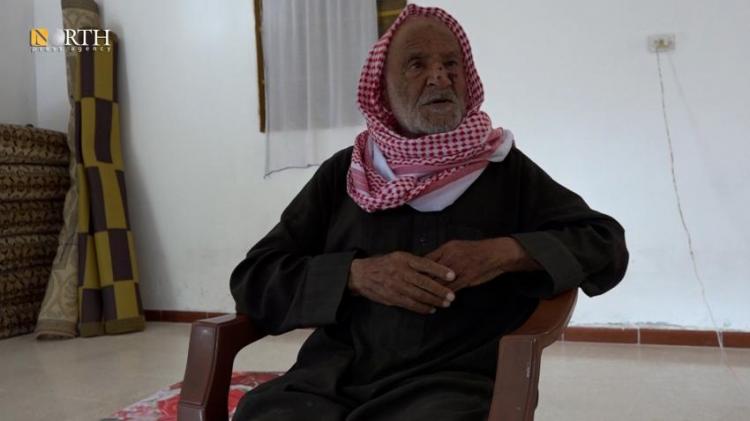Raqqa – Manbij – Aleppo northern countryside – North-Press Agency
Mustafa al-Khalil/ Saddam al-Hassan/ Dejla Khalil
The outbreak of the coronavirus pandemic in the world reminded elderly people in Raqqa, Manbij, and the northern countryside of Aleppo of their memories of epidemics and pandemics that spread in Syria in the middle of the last century, such as smallpox, cholera, measles, and whooping cough. They told North-Press about how the people of the region dealt with the pandemics back then.
Cholera
Fidan Mousa, a 79-year-old IDP from the village of Maamlo in the Mabata district in the Afrin region, remembers that four people in her area died from cholera 45 years ago.
Mousa points out that people with cholera suffered from severe pain and diarrhea, and there were no doctors or cars available, as is the case now.
"We kept away from the infected person and we did not allow our children to visit the home of the cholera-infected family for fear of infection," she said.
Mousa, who is spending the lockdown period in the northern countryside of Aleppo, told North-Press: "The coronavirus reminds me of those days when we used to stay home as well and did not come close to the infected person."
Cholera still has a significant impact on the population in developing countries, especially in African countries, and the years-long wars in Yemen and Iraq have contributed to the return of the disease and the recording of hundreds of cases, in addition to the deaths of a number of these cases as a result of the absence of treatment and medical care.
Smallpox
70-year-old Khalaf al-Hamdan, a resident of Manbij countryside, recalls the beginning of 1965, when he witnessed the spread of smallpox in his area. "Many people died in that period because of the outbreak," he said.
He points out that people used to isolate the infected in a room and place food and drink for them from a distance, "There was no treatment at that time, and a few of the infected survived. The scars remained on the faces of those who recovered," al-Hamdan said.
Al-Hamdan notes that some people resorted to the use of natural herbs to treat smallpox. "There were those who recovered from smallpox despite not being treated, and there were those who died despite their use of herbs."
Al-Hamdan remembers that people discussed how clans left their place of residence when it was time to move away, leaving the smallpox patient behind for fear of infection, after leaving him with enough food to last a while.
Today, al-Hamdan trusts global health guidelines that say the only way to prevent the novel coronavirus is to quarantine at home and not to mix with people.
Smallpox, which had a fatality rate of 20%, is the first disease eliminated by mankind. In 1980 the World Health Organization declared the total elimination of smallpox after it killed, maimed, and blinded millions throughout its long history.
Infected survivors
93-year-old Ali al-Ahmad al-Shibli, a resident of Kassrat Muhammad Ali village 8 km south of Raqqa, describes his suffering with smallpox. He was infected with the disease when he was about 15 years old in the 1940s, amid poor health conditions and absence of medical services. "There were no doctors, no hospital, no medication prescribed for a smallpox patient who was left alone to struggle with his pain without the intervention of anyone," he said.
Al-Shibli, who still bears the scars of the disease on his face, stresses that humans cannot understand pandemics or find guaranteed treatments for them. "God is the one who healed me," he said.
He was not the only one infected, but seven other children were infected in the village, five of whom died and two of whom recovered.
Al-Shibli recited verses of poetry that talk about the suffering of the infected with smallpox by the Arab poet Abdullah al-Fadil, who was left by his tribesmen in the Syrian Desert after falling ill with the disease. He continues: "Despite the high status enjoyed by the poet Abdullah al-Fadil, his tribesmen still left him alone, fearing the infection."
Al-Shibli married two women who died in recently, and his children and grandchildren number more than 100, according to one of his grandchildren.
Primitive treatments
98-year-old Ibrahim al-Abdullah al-Khalaf, also from the village of Kassrat Muhammad Ali, remembers a number of epidemics that he witnessed during his lifetime, such as measles, smallpox, fever, and whooping cough.
"Measles, for example, was a widespread disease in the countryside of Raqqa and the Jazira region in the early 1940s," he said.
Al-Khalaf lists ways that people used to deal with diseases and pandemics, including that some people used to visit sheikhs in order to obtain amulets for the patient to put in water and drink, while others put a thread on the patient's wrist.
Al-Khalaf asserts that all these methods were useless; they did not heal nor benefit the patient.
He points out the prevalence of whooping cough, which was popularly known as "al-Awaya" disease, and how it was associated with the spread of primitive methods of treatment among those who were infected in the past as a result of the lack of doctors and hospitals.
One of these primitive methods, was to give donkey's milk or fox meat that gypsies had brought from the Syrian desert to the infected, in exchange for a sum of money they received from the patient's family.
The World Health Organization estimates that the global vaccination to prevent whooping cough saved 687,000 people from dying from the disease in 2008.
At the time, Raqqa was still a large village without doctors, forcing well-off residents to travel to Aleppo to seek treatment.

